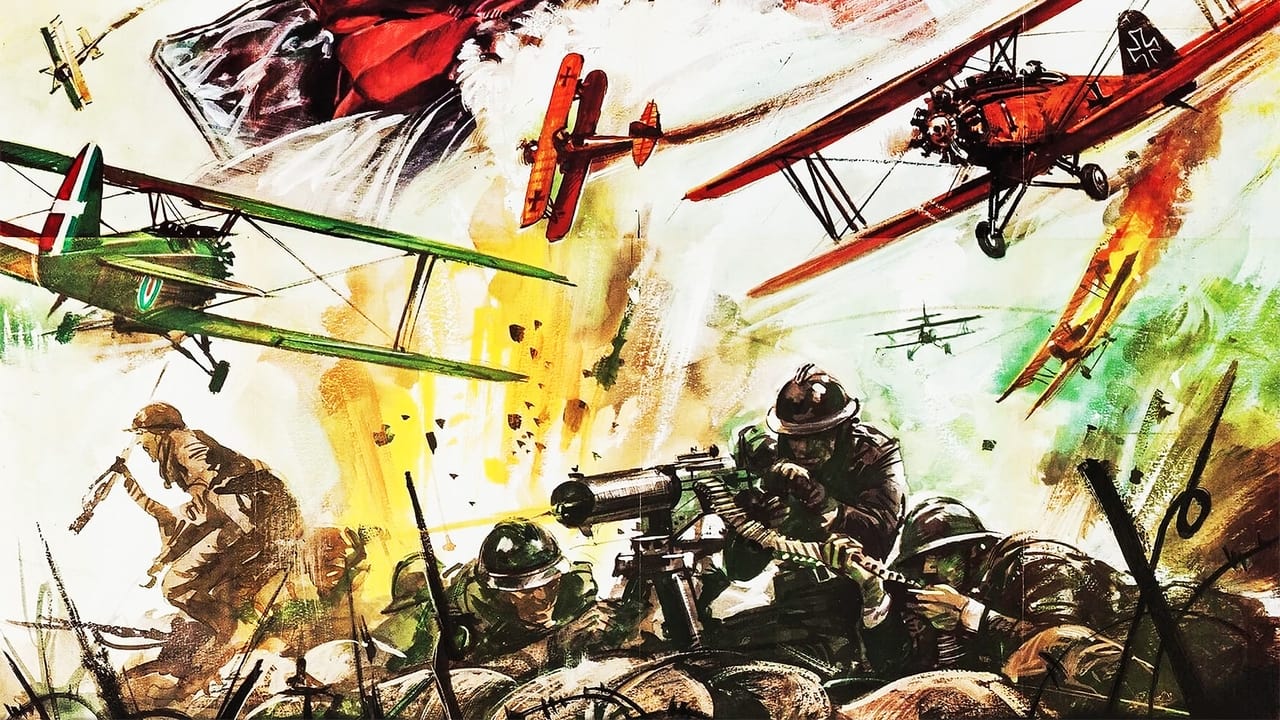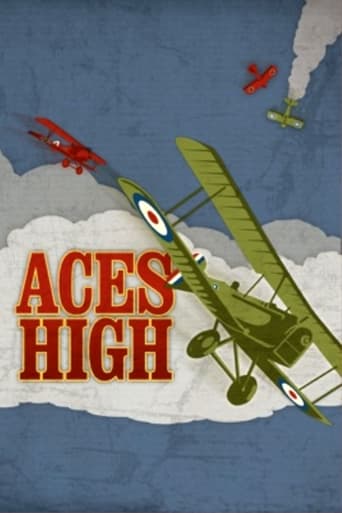

I think this is a very believable film. All the actors perform well and it all adds up to an excellent anti war film. Malcolm McDowell is brilliant as Gresham. At the start of the film he goes back to his old school and tells tales about caning the enemy. In reality he is close to cracking up due to the stress of constant fighting and having to send ever younger boys to their deaths. Peter Firth plays the naive young pilot who believes Gresham is a perfect hero and that the war will be fun. He slowly begins to see things differently when he sees the death and suffering at the front when Gresham goes to pick up a German pilot he has shot down. Then there is Simon Ward who cannot face flying anymore and uses supposed illness to avoid going up. There is also a very realistic scene where one of the pilots is seen falling to his death in flames when his plane catches fire. Gresham has tried in vain to get parachutes issued but the commanders have decided that parachutes could mean that a man is more likely to jump than carry on fighting. This gives the message that they don't care about the men as there will always be others to replace them. In some versions of the film I have seen the ending is immediately after Peter Firth's character (Croft) is killed in the collision with an enemy plane. To me this is wrong because the last part after this is one of the strongest in the film. Gresham is back in his office as the sole survivor of the last mission and he is struggling to write letters to the families of the dead. He makes several attempts. Then 3 new young kids are introduced and Gresham is once again faced with knowing that they too will most likely soon be killed. He goes to the window and in his imagination sees Croft coming towards him. This shows a man pushed to the limit who cares deeply about the killing but realises he cannot do anything about it. I rate this as a great anti war film. The characters are believable and the action scenes are realistic. Although some scenes were borrowed from the Blue Max most of them are new and even though most of the planes are not original they still look excellent. Overall strong performances, excellent action scenes and a believable story make this a film well worth seeing.
... View MoreI caught this film on a Sunday afternoon when nothing else was on.I'm interested in the history of the period, but I can't say that I am a total plane nut or could tell you that the wrong flap or control stick was used on a certain plane etc.I thought the piece had real emotion running through it - this is far from a propaganda piece, a glory-romp detailing the beginnings of the RAF. I found it a very convincing and personal take on the futility of air war during WW1.The film is quite depressing, but then the war itself was no walk in the park, was it? We get to see first hand how the constant pressure affected these young men, we see how many of them were killed, how many could barely fly the planes. I thought that the flight scenes, and the scenery/sets generally, added to the overall ambiance and feel of the film. The 'barrack' or 'mess' they live in is just a shack with a piano in, and the only solace they have is getting drunk every night and singing songs. I genuinely felt their terror, and for me it pervades the entire film. It shows how various men cope with this massive pressure - some better than others - and it highlights a time very different from ours, a time when most of these young airmen had no idea what was in store for them. I believe that WW1 changed the world in many ways - artistically, musically, politically - and more. This is a little vignette into a lost world. It shows (but doesn't rub in or over-egg) the class system at the time - as others have mentioned, the RAF was really the preserve of the upper classes at that time, and this is a beautiful counterpart to the working class ground crew. This isn't an obvious film, I don't think, it doesn't spell things out for you, you are just awashed with small and loving details, character traits, believable props/scenery etc. It just feels right, and is quite moving.For those who bemoan the fact that it's not like Journey's End - although it's a 'revised' version of the play, it is going to be totally different - I don't understand how you can compare the claustrophobia of the trenches with the much more 'open' warfare and living conditions of the RAF. Rather than let myself get hung up about this, I treated Aces High as its own piece. I've seen Journey's End at the theatre, and enjoyed it, but to compare the two and berate Aces High for not being an exact port or copy of the origin I feel is missing the point.I was really surprised and happy at this little gem I found on a Sunday afternoon. I think it helps to have some knowledge of the period to really appreciate the film, but I'd recommend this film to anyone.
... View MoreWhile, all WWI aviation flicks bear their fair share of merits and admirable depictions of warfare over the front(with, of course, the exception of the recent and insufferably cheesy "Flyboys", Aces High ranks as unparalleled champion in depicting the forbidding overall sensation of World War I aerial combat. Unlike the romantic and heroic endeavors as popularized by the recruiters (of which I suppose Tony Bill also qualifies), dogfights are portrayed as a harrowing, fearful, and thoroughly traumatic experience, thus culminating in a host of undesirable personality side-effects as reflected by the various manners in which the battle hardened veterans of 56 squadron have exhibited in order to cope with the prolongued stay on the verge of the frontline.Squadron leader Malcolm McDowell, for instance, can longer undergo combat sorties without saturating himself thoroughly with liquor beforehand, which he discloses as one of the reasons in which he's socially isolated himself from his wife in order to spare her any habitual bouts of his drunken temperament. As another pilot, Crawford's constant battle-weariness has progressively waned his psychological status to the breaking point, whereby he attempts to fabricate a medical condition in which to be relocated away from the front. Sure enough, by the film's end, Crawford's constant, as he himself characterizes, "frightful funk's" have finally driven him quite literally past the brink of insanity.As the squadron's sole replacement for the week, newcomer Peter Firth's posting to the squadron is analyzed through the film's progressive subtitles, counting the days in which he survives in order to illustrate the alarmingly brief life-expectancy of a World War I fighter pilot. Needless to say, his dreams of idealism and glory become instantly shattered within a few moments, thus guaranteeing that he himself will come to understand the grim futility of his surroundings prior to his own demise.While, potentially jarring at first, the progressive series of events begin to justify McDowell's constant sense of anguish at the sight of new recruits who arrive and perish with such intensified regularity.Indeed, like all war movies, this film suffers from a few if trivial inaccuracies, including the modified wing sections and landing gear of the SE-5a replicas in effort to render the types as more aerobatically feasible, in conjunction with Presentation of German types that, aside from the Fokker Eindekkers, don't exactly embody representations of particular aircraft type, but accurately reflect the colorful and varied assortment in which the German's utilized multiple types within individual squadron's coupled with an habitual refusal to indulge in camouflaged paint-jobs that would have otherwise augmented their fighting capacity.One aspect, which I greatly appreciated is manner in which Jack Gold accurately establishes how pilots strayed far from one another in the aftermath of an dogfight, thus relaying each pilot with the burden of navigating their own way home. ALso, the widespread devastation of the front is accurately represented as well, as exemplified by a particularly effective moment of solitude, in which Firth and Plummer indulge in picnic at a riverside, only to become flabbergasted at the sight of living fish, swimming upstream. Even within this lull in battle, this moment of relaxation features the ominous but distant rumble of artillery fire in the distance.Granted, over the past week, I've resorted to an habitual level of repeated screenings of this classic, if only to compensate for having endured the veritable cliché-ridden atrocity otherwise known as "Flyboys", a wildly inappropriate endeavor of cartoonish escapism rendered all the more offensive by its perpetual "fun'n'games" conception of war over the Front.If anything, when stacked side-by-side, "Aces High" and "Flyboys" embody the veritable epitome of opposing extremities, thus symbolizing the respective "right" and "wrong" manner in which to construct a movie about World War I aviation.Given that Tony Bill's conception of his own self-styled epic as "the first World War I aviation film in 40 years" reflects his lack of awareness of the existence of this title, I highly recommend that he issue a thorough screening of this movie ASAP. Perhaps then, Tony Bill might learn something outside of his all-too-glamorous and boyish conceptions of aerial warfare over the front, and perhaps a even significant reduction in the overall "cliche factor" to boot.Bottom line: compare and contrast, one will soon come to acquire further merit in which to conclude that "Flyboys" unequivocally sucks.
... View MoreDespite the excellent cast, this is an unremarkable film, especially from the aviation perspective. It may be somewhat better than the egregious "von Richthofen and Brown" but not by much. "Blue Max" remains the best of a small market over the last 35 years while "Darling Lilli" is fun if not taken seriously. It's interesting to speculate what ILM could do with Zeppelins and Gothas in a new, high-quality WW I aero film.
... View More